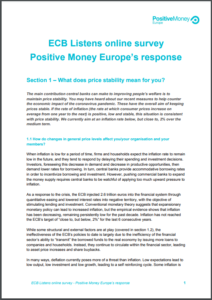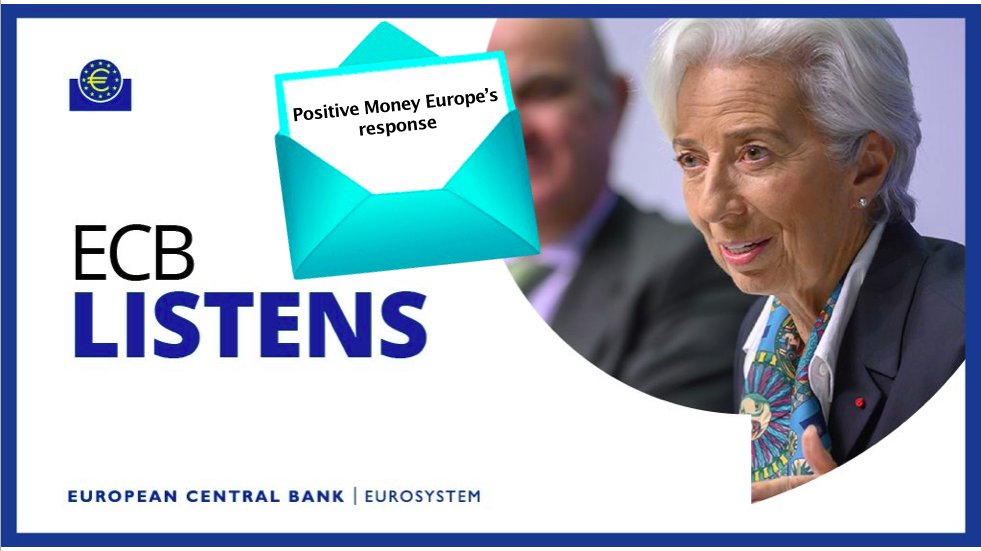The European Central Bank recently launched a new survey asking individuals and organisations based in the eurozone for their views on the bank’s current monetary policies, as part of the upcoming Strategic Review. The survey encourages respondents to answer questions on price stability, economic concerns, their own priorities and how the bank communicates with people.
 Positive Money Europe has submitted a comprehensive response explaining how the bank can meet its inflation target, honour its environmental obligations and improve its diversity.
Positive Money Europe has submitted a comprehensive response explaining how the bank can meet its inflation target, honour its environmental obligations and improve its diversity.
Here are our main points:
What does price stability mean for you?
- Today deflation is a bigger problem than inflation. Low expectations lead to low output, low investment and low growth. This means current low inflation is likely to last for some time;
- The ECB should revise its inflation goal to allow higher than 2 percent inflation to make up for the missing target;
- Housing prices are particularly relevant to the ECB’s monetary policy and people’s purchasing power. They should be included in the Eurozone’s Harmonised Indices of Consumer Prices (HICP), as other major central banks do.
What are your organisation’s expectations and concerns?
- Not everyone benefits equally from low interest rates, as combined with the ECB’s quantitative easing programme, they boost asset prices and exacerbate inequality. This accelerating growth of income and wealth inequality is extremely concerning;
- Patterns of deflation are being reinforced by structural factors. Automation is weakening the bargaining power of workers, as less people are needed for increasing levels of productivity. Large and persistent increases in part-time employment, fixed and short-term contracts, underemployment and related factors are contributing to the rise of a new precariat, especially amongst the young people;
- The ECB does not currently have the right tools to achieve its mandate. Direct income support for households would boost consumption and ease the debt-deflationary cycle for households, particularly at the bottom end of the distribution.
What other topics matter to your organisation?
- Climate change. The ECB must align its asset purchasing programmes and collateral frameworks with the Paris Agreement to support the low carbon transition;
- Climate reporting transparency. The ECB should regularly report climate-related risks and other relevant information to the general public;
- Sustainable investment. The bank also needs to encourage more sustainable bank lending through its refinancing operations and fill the green investment gap;
- Diversity. The ECB should strive to support diversity within its staff and at board level;
- Financial inclusion. The ECB should be given a stronger role in supporting financial inclusion, for example by introducing a digital euro system where all citizens could be provided with a free of charge bank account at the custody of national central banks.
How can we best communicate with your organisation?
- The ECB’s communications should be less ambiguous and more consistent. For example, there is a contradiction in some Governing Council members claiming the ECB is effectively providing huge amounts of liquidity, while also reinforcing ideas such as “fiscal space”, “debt sustainability” and that all debt has to be repaid;
- Both the ECB and national central banks should communicate more honestly and transparently about the key function they play in the economy – the management of the money supply by overseeing money creation by private banks;
- The ECB should also increase engagement with civil society.


The policies of the ECB are contributing to unaffordable house prices and rents in Europe’s cities. The EU Charter of Fundamental rights must be respected and promoted by the ECB and it contains many housing rights. The ECB and ESRB adopt a boom and bust housing model which is contrary to the housing policies of many Member States. ECB monetary policy must be revised so that is includes housing costs in its calculations but also recognises and supports the role of social housing in Member States. Housing is more that a bank asset and curbing credit-fuelled house price bubbles with the potential to destabilise the euro financial system is really a very limited approach to this issue which affects so many Europeans.
For a more detailed explanation see Housing Rights and EU Economic Governance Briefings Papers – this time it will be different? http://www.nuigalway.ie/chlrp/news/this-time-it-will-be-different.html
Atualmente vivemos uma crise social e financeira surgida de catástrofes naturais, pobreza e saúde.